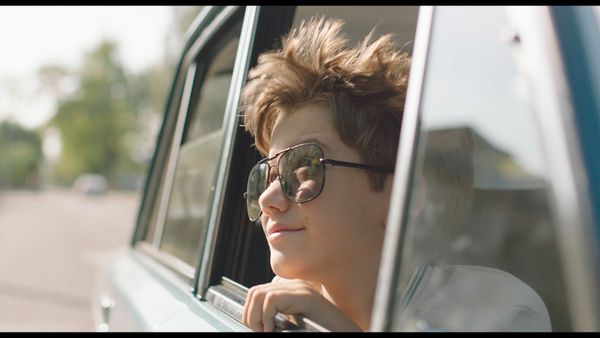Eye For Film >> Movies >> Rock Paper Grenade (2022) Film Review
Rock Paper Grenade
Reviewed by: Oskar Ban Brejc

Faded wallpaper with a green pattern covers every inch of the wall. The cabinets are made of dark wood as if dreading the whiteness of minimalist design. On the other side of the same wall, posters of Ice-T, Michael Jordan, and Sylvester Stallone cover the old wallpaper beneath it. A Soviet past in the first room and a yearning for the West in the second. Such is the symbolic conflict in Rock Paper Grenade, the first fiction feature by Ukrainian filmmaker Iryna Tsilyk. The stylish follow-up to her acclaimed documentary The Earth Is Blue As An Orange is based on her husband Artem Chekh’s autobiographical novel about growing up in Nineties Ukraine.
The room with American superstars on the walls is Timophiy’s. He is shown first as a child (Andriy Cherednyk) but most of the film focuses on his teenage years (when he is played by Vladyslav Baliuk). He lives with his mother (Anastasiya Karpenko) and grandmother (Halyna Veretelnyk-Stephanova). As his father (Andrey Isaenko) returns home from unexplained trips increasingly rarely, Timophiy develops a connection with Felix (Yuriy Izdryk), a war veteran, drunkard, and also the boyfriend of Timophiy’s grandmother. In the background of this conventional coming-of-age narrative, however, are subtle undertones of the fall of communism and the arrival of the West. Rock Paper Grenade doesn’t present the East-West distinction as primarily an ideological one – although the political aspect is present below the surface of the action, Tsilyk wants the audience to be engrossed in the events of Timophy’s life. These are, at times, joyful and at times sad, but they are all permeated by gentle comedy.
The dynamic between the actual and the symbolic is most obvious in a sequence where Felix buys Timophiy new sneakers: Felix can only afford them because of money he has got from selling old grenades. Is the traumatic past superseded by the joys of consumerism? Tsilyk doesn’t dwell on the political potential of the metaphor: what is selling weapons and buying shoes compared to actually enjoying those shoes? Timophiy’s youth is too relentless to consider the paradox of American culture suddenly engulfing his society – rather, he simply enjoys it.
Montage sequences of Timophiy and his first girlfriend Toma (Olexandra Semenko) are drowned in energetic Nineties music, one of them featuring a shot of a beautifully contrasting bright fire and dark sky, both reflected at the bottom of the frame in a lake. It does seem, however, that in the attempt to fully engross the viewer in feelings, some images come close to losing their narrative value. The colourful stylisation becomes, at times, so apparent that it risks reducing Timophiy’s emotions to nothing more than a (nonetheless stunning) contrasting colour palette.
Is Timophy’s youth in a way parallel to that of his country? Is his/its youthful thirst for everything new headless or is it spontaneous? A smartphone in the final sequence indicates that we are no longer in the past. The short sequence substitutes narrative for commentary almost directly. Both Timophy and Ukraine have grown up – and they seem to have grown up into a reality so overpowering that it cannot but be acknowledged even by fiction.
Reviewed on: 20 Oct 2022

















